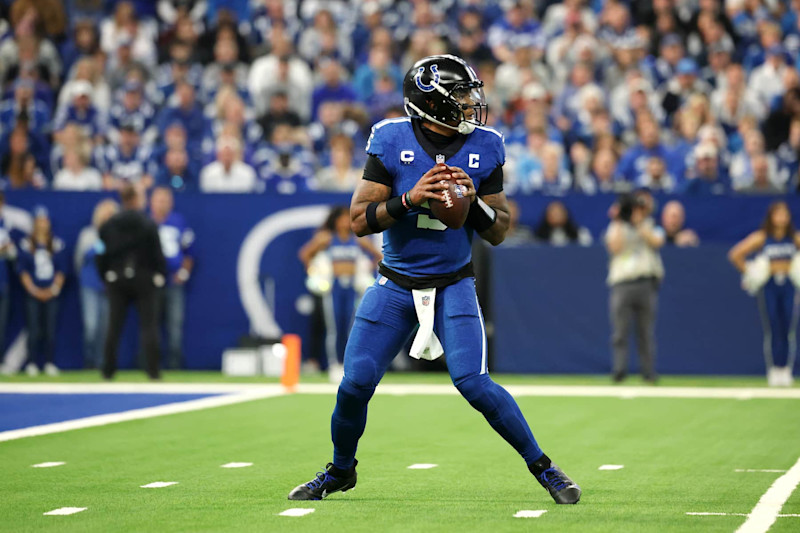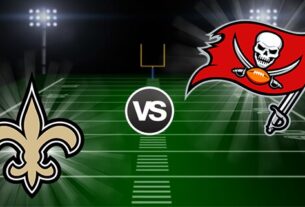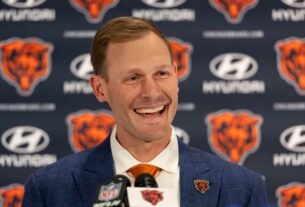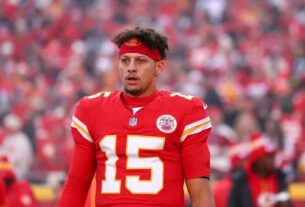Colts quarterback Anthony Richardson dropped back from the 11-yard line, saw his tight end drifting between layers of zone coverage, and shot a ball directly to him – between the numbers, in the web of two gloved hands, shaded away from the nearest defender.
Drew Ogletree then dropped it.
Richardson was so confident he had scored that he was high-kneeing on the sideline to celebrate. When he saw the ball bounce lifeless to the ground, he flipped his head back and smiled.
Sometimes you have to chuckle to keep from yelling.
That had also happened on the Colts’ first drive of the game, when Richardson drove them inside the 10 and faced a third-and-six. He dropped back out of shotgun, hoping for an Adonai Mitchell route to develop in the end zone, only for Za’Darius Smith to spin Quenton Nelson around like a top and throw his 270-pound frame into the 22-year-old quarterback’s lap.
Richardson had just enough time to stand tall and hurl the ball out of the end zone before collapsing to his back on the turf. However, once running back Jonathan Taylor hauled him back up, Richardson let out a fierce yell and fixed an angry glare at the offensive line.
“I knew we were in the red zone,” Richardson said after his team lost to Detroit 24-6. “And we just didn’t finish.”
Instead, those two red-zone possessions drew a clear line in the sand as to where a game against the fast-paced Lions would be lost.
It was so obvious that a quarterback screamed and laughed in an attempt to relieve the pain.
This game was meant to be a follow-up to what happened just seven days before in New York, when Richardson came from a two-week benching and played the game of his life, sparking his first fourth-quarter comeback triumph. After two of the most embarrassing weeks of his life, Richardson found himself with a plethora of positives to build on after going 20 for 30.
He was finally the young quarterback this team had been looking for, both in terms of performance and temperament, consistency, and confidence.
He was largely the same player on Sunday against the Lions. But it’s difficult to see through the box score when he finishes 11 of 28, and it’s difficult to justify given the Lions’ home thumping.
But it’s reality on a day when he collected a season-high 75 penalty yards and took six hits from Lions defenders without recording a sack.
“I don’t think the penalties were negating his incompletions,” wide receiver Alec Pierce said. “It was a lot of completions and a lot of good balls that got called back, so I’m sure his stats are not really reflective of how he played and threw the ball.”
They weren’t, although it does happen in sports like football, which is touted as the ultimate team game.
The Lions are an example of this, as they have revived Jared Goff’s career after the Rams gave up on him by instilling confidence in him and surrounding him with the league’s best offensive line, which includes a reigning 800-yard tight end in Sam LaPorta, a reigning 1,500-yard wide receiver in Amon-Ra St. Brown, and two running backs in Jahmyr Gibbs and David Montgomery, who have already combined for 21 touchdowns on the young season.
It takes two to tango, and for as young as Richardson is, he understood that early on. Take his quote from the NFL Scouting Combine in the months before the Colts made him the No. 4 pick in the draft:
“I can definitely get better and delivering the ball and helping my guys up. But I also can’t catch every pass,” Richardson said then. “If I could, I would, definitely. But it’s also helping guys out and helping guys help me.”
It’s not a quarterback line to use, especially at this level, where the position functions as CEO of a billion-dollar club. The benching was all about getting him to learn those truths a little better, to endure two weeks in the dark while a nation pounded him for professionalism and dedication, all so he might finally emerge and climb to the level of those around him.
But that threshold was never met on Sunday at Lucas Oil Stadium.
Some of the concerns were new, such as the penalties that wiped out some of Richardson’s biggest plays, including a 21-yard completion to Kylen Granson, a 7-yard first-down conversion to Josh Downs, and a 30-yard explosive gain to Downs, all of which were called back.
“A lot of our explosive plays got called back,” Downs informed the crowd. “The game probably wouldn’t have gone like that if we get those explosive plays.”
But it did, since the Colts’ guys who are expected to support Richardson were left blocking defensive linemen’s faces or tackling rushers to the ground.
They fumbled throws, from Ogletree’s lost score to an explosive gain when Ashton Dulin failed to land his second foot in bounds. They didn’t rush without him, and his 61 yards on 10 carries accounted for 64% of the team’s rushing success. Taylor gained only 35 yards on 11 carries, the fewest he’s had on double-digit carries in his career.
“I think we could have been a lot more physical out there,” Richardson said. “I feel like we could have played a little bit more bully ball, to say the least.”
They couldn’t keep up in pass protection, forcing him to throw the ball away with opponents draped around his waist, resulting in six quarterback hits and zero sacks. And they couldn’t get open in the middle of the field, with three active tight ends combining for zero catches on three targets.
For as much as the Colts have rightfully challenged Richardson to mature, they have failed to progress alongside him. And it has left them where they started this season, by converting run-first players into a pass-happy assault that lacks fundamental plays to establish a rhythm.
And rhythm, as Michael Pittman Jr. pointed out, is simply a metaphor for trust in a rookie quarterback.
“I think we can just expand and help him out by getting some easier completions,” Pierce remarked. “It’s difficult to throw the ball down field. He needs to take a deeper step back. It’s harder on the offensive line. I believe we can help him out by collecting additional quick game items.”
Pierce is the third Colts starting wide receiver to publicly propose taking shorter routes to stay on the field and avoid hits away from a quarterback who has missed 15 games due to injury over the last two seasons.
Pierce, Downs, and Pittman have all made this argument, but they are not the ones who designed the offense.
Shane Steichen responded admirably last week to the opportunity to implement a new playbook for Richardson’s return that might be better suited to his quarterback’s young mind and dual-threat ability. The Colts carried the ball on 20 of their first 27 plays in that game, and while the run game was not particularly successful, it gave Richardson a boost with two rushing touchdowns and reduced the risk of turnovers, which had been a problem for them.
However, this week’s challenge was considerably more difficult because they didn’t have to stay up with Aaron Rodgers and the Jets. This was the strongest offensive in the NFL, so when those red-zone possessions failed to produce a touchdown, the Colts knew they had to make them up.
All that resulted in was terror.
Steichen called only one rushing play for Taylor in the second half. It came from his offensive line, tight ends, and receivers, who were unable to complete their finest plays without being penalized.
They were thought to be the composed ones, the elder professionals who did not lose their jobs after the offense went five weeks without scoring more than 20 points. However, Sunday’s journey home demonstrated the exact opposite of poise.
This was stress caused by a unit that was not gelling, looming questions with no clear answers, and a season that was on the verge of failing at 5-7.
The schedule is set up so that the Colts can conceivably make a run to the playoffs. Only 7-5 Denver offers a difficult game on paper, with the other four games coming against clubs from New England, Jacksonville, Tennessee, and the New York Giants, all of which are 10-35.
However, much as Sunday’s game against the Lions was potentially an encore for a rejuvenated quarterback and a revamped offensive identity, ideas do not win games. Ogletree was theoretically open, Smith was theoretically blocked, and Dulin was theoretically prepared for a massive gain.
The Colts need solutions, not theories. And until they find some, their quarterback will have to wear his frustrations, one snarky chuckle and furious shout at a time.



